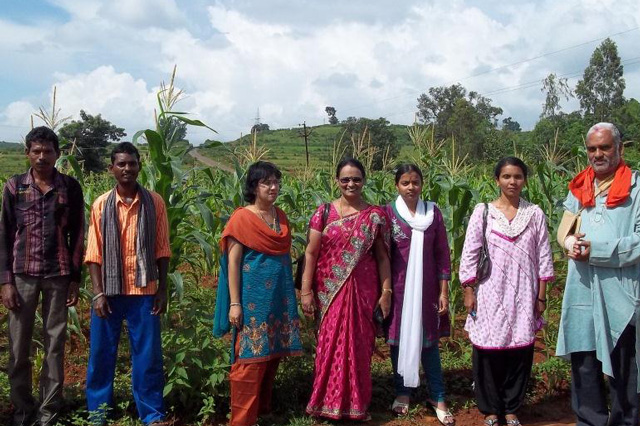Foundation Programme Manager, Mary Faherty, meets with Rachael Raykumari, from India, and Gertrude Kenyangi, from Uganda, to discuss the impact of climate on people in their countries.
Blog by Mary Faherty, Programme Manager, the Foundation
On a cold, wet March afternoon in Dublin, I had the privilege of meeting Rachael Raykumari from India and Gertrude Kenyangi from Uganda, both of whom were in Dublin attending Trocaire’s 40th birthday conference.
It was an informal meeting over a cup of tea and after trading comments on the Irish weather, we moved on to discussing climate and its impact on people in their countries.
Gertrude Kenyangi is from Uganda and works with SWAGEN, an organisation committed to creating strong grassroots women’s groups that can actively participate in national development.
I asked Gertrude about climate change in Uganda.
“Climate change is already bringing disaster in my area”, she said, noting that droughts are increasing, floods are occurring where there was never floods before, traditional crops can no longer be grown in many areas and the incidence of diseases such as malaria is increasing. “When help from the outside is not available, what are we going to do?”
Gertrude said that not enough is being done by global leaders on climate change. “We have one world and we are all citizens of that world”, she said. “Climate change is a justice issue because the most vulnerable are the most affected and the most affected are women”.
She spoke about the importance of participation and how some development programmes are “well-intentioned but erroneously conceived” when they don’t involve the people most affected beyond token consultation.
Rachael Raykumari works for Women’s Organisation in Rural Development (WORD), an organisation working with indigenous people in the state of Orissa. The people in her area are heavily dependent on forests and non-timber forest products but she reports that, due to climate change and poverty, 60% of the forests in the region have now been destroyed. Deforestation and the commercialisation of land has affected livelihoods.
“Food insecurity is the main problem”, she said, noting that twenty years ago, the region would have eight or nine months of rain whereas now the region is more likely to have three or four months of precipitation.
“Because people are depending entirely on the rains, this is a big issue for agriculture”, she said. She reported that in some cases, people are migrating to other states and this movement of people is also affecting the spread of HIV/AIDS and other sexually transmitted diseases.
Rachael said that her country must take the proper measures to reduce emissions, through strategies at a state, national and district level. She also said that the whole world has to look at consumption patterns which are leading to these issues, not just food consumption but also the impacts of lifestyle choices in developed countries.
“Our ancestors gave us this world and we are taking a credit card from our grandchildren. Each country is fighting for our own and we need to all work together”. This, Rachael said, requires listening to both the north and the south, noting that it is very difficult for individual organisations to address global issues without getting trampled on. “This is why civil society movements are so important, so that people can claim their rights”.
I asked Gertrude if she has hope for a better future. “We at the grassroots have the will and where there is a will, there is a way”. Her positive response is a reminder of the importance of active grassroots involvement for the action required to realise climate justice.
Despite the frustrating realisation that much of what these women said has been said over and over again, without the requisite action, I left the meeting in an upbeat mood, encouraged by the dynamism and determination of two women committed to changing things for the better.
“Real revolutions are led by grassroots” Gertrude said.
If more people like Gertrude and Rachael band together, they will be a force to be reckoned with.
Related Links:


